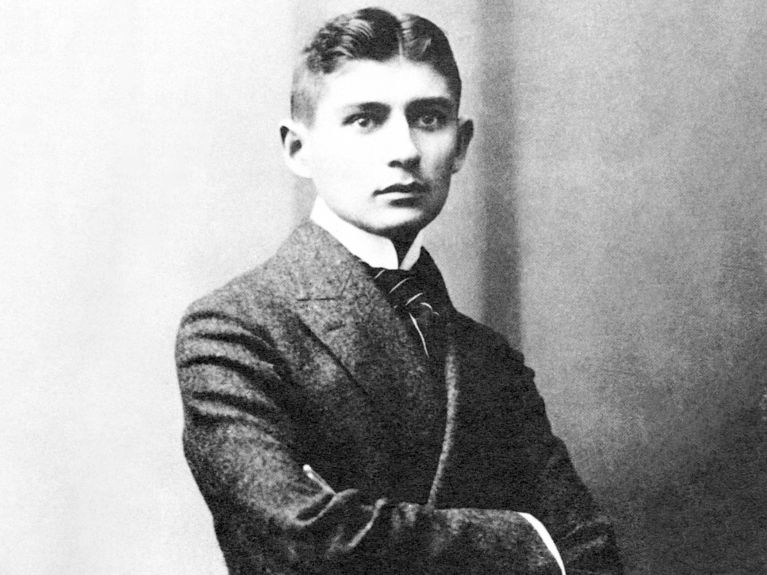Franz Kafka – the eternal enigma of world literature
The world's most widely read German-language author died on 3 June 1924 – and left instructions for all his writings to be destroyed.

He owes his fame to a unique literary talent. But it is only thanks to a huge betrayal of trust that he became so well-known. Franz Kafka.
Though he is repeatedly cited as one of the greatest German writers, this is only because of the language in which he wrote – and in which he expressed himself like no other writer before him: German. Born on 3 July 1883 in the city of Prague, Kafka was in fact Austro-Hungarian. Prague was also where he spent most of his life, which lasted only 40 years until his death on 3 June 1924. He came from an extensive Jewish family and was among the approximately seven per cent of the Prague population that spoke German, at a time when what is now the Czech Republic was still part of the Austro-Hungarian Empire. Prague was his home, but like so much else in his life, this was not something that gave Kafka a clear sense of identity: “Prague won’t let go (...) This little mother has claws.” Of his language, he wrote: “German is my mother tongue, but Czech is close to my heart”.
Dieses YouTube-Video kann in einem neuen Tab abgespielt werden
YouTube öffnenThird party content
We use YouTube to embed content that may collect data about your activity. Please review the details and accept the service to see this content.
Open consent formKafka and fame
In his everyday life, Kafka was a successful member of staff at a semi-public insurance company; at night he was a failed writer. “A life of manoeuvres,” as he called it: he would work in the office in the morning, sleep in the afternoon and dedicate himself to his writing at night. His meticulous diary entries and countless letters to friends mean that there is a lot about his private life that we know and can read about.
As Gregor Samsa awoke one morning from uneasy dreams he found himself transformed in his bed into a gigantic insect.
He also wrote about the night in which he found himself as a writer: in the night of 22 to 23 September 1912, Kafka wrote the story The Judgement within a period of eight hours, as if in a frenzy. The story of a man inexplicably sentenced to death by his father after a mystifying dispute, The Judgement typifies everything that was later to bring Kafka worldwide fame. But global acclaim didn’t come until long after his death – initially in the USA and France from 1945 onwards, and finally in German-speaking countries in the 1950s. Today, Kafka is the world’s most widely read German-language author.
Kafka and his works: what is meant by Kafkaesque?
Kafka’s works are enigmatic, mystifying, sometimes even eerie and nightmarish. Much remains nebulous and barely tangible; no mention is ever made of a specific place or time. Yet his language is the exact opposite. Writing in a succinct, precise and unelaborate style, he explores universal themes such as identity, existential angst, the absurdity of life and bureaucracy. This is reflected in the opening sentences of his most important works, which are among the most famous in literary history. In terms of substance, however, much remains ambiguous in Kafka’s work; he makes frequent use of the subjunctive – a verb form that conveys a sense of the unreal.
Someone must have slandered Josef K., for one morning, without having done anything truly wrong, he was arrested.
He also uses ambiguous terms without defining them: is The Trial a court hearing, legal proceedings, or both? Is the “law” a scripture, a person, a higher authority? Kafka’s worlds are so distinctive, enigmatic and absurd that a new adjective was even invented to describe them: Kafkaesque. His works have been interpreted thousands of times, yet they defy any definitive understanding. As Theodor W. Adorno said: “Every sentence seems to say: interpret me – and no one will tolerate it.” And the author himself? He wrote: “(I) consist of literature, I am nothing else and can be nothing else.” But he also said he was unable to offer an explanation of his writings.

Dieses YouTube-Video kann in einem neuen Tab abgespielt werden
YouTube öffnenThird party content
We use YouTube to embed content that may collect data about your activity. Please review the details and accept the service to see this content.
Open consent formKafka and love: can a writer get married?
Franz Kafka was anything but shy: he was sociable and had lots of friends, the most important being Max Brod. And Kafka loved self-confident women, especially Felice Bauer – who he got engaged to twice. We also know of several other relationships that Kafka had with women of very different characters. But as little as Kafka’s girlfriends resembled each other, the relationships developed along very similar lines. The closer the relationship became and the more Kafka longed to get married, the more he was plagued by doubt. Not about his feelings or his desires, but whether his life as a writer was compatible with that of a husband. He speculated about his own emotions and wishes, searching among literary role models and friends for relationships that could serve as a model for him. The result: Kafka remained unmarried throughout his life, and all his relationships failed.
Kafka and the huge betrayal of trust committed by Max Brod
Kafka was tormented by doubt throughout his entire life. It destroyed the love of his life and his relationships – and it almost destroyed his literary oeuvre. As firmly convinced as he was of being a writer – only a writer and nothing else – he was also at odds with his works. “If they are to disappear completely: this is what I really wish for,” he wrote. In 1917 Kafka was diagnosed with tuberculosis, an incurable disease at the time, and he eventually passed away in a sanatorium on 3 June 1924. He had previously instructed his best friend and literary executor Max Brod to destroy the majority (and most important) of his unpublished works, including the novel fragments that are now so famous. He himself had already destroyed some of his writings, though it is not known what these were. Brod disregarded his best friend’s last wishes – and instead went ahead and published Kafka’s works.
Dieses YouTube-Video kann in einem neuen Tab abgespielt werden
YouTube öffnenThird party content
We use YouTube to embed content that may collect data about your activity. Please review the details and accept the service to see this content.
Open consent formKafka and our modern-day world – is he worth reading?
Franz Kafka’s work remains deeply enigmatic to this day. And it is timeless, too: like all great literature, it has not lost its relevance. On the contrary, his works can be read without any knowledge of history – not least because he himself chose not to set his writings in any particular time or place. Anyone wishing to become more familiar with Kafka is well advised not to read about him, but to read what he himself wrote. Here are our top seven recommendations:
- The Trial
- The Castle
- The Man Who Disappeared
- Letter to His Father
- The Judgement / The Metamorphosis
- A Hunger Artist
- The Penal Colony




